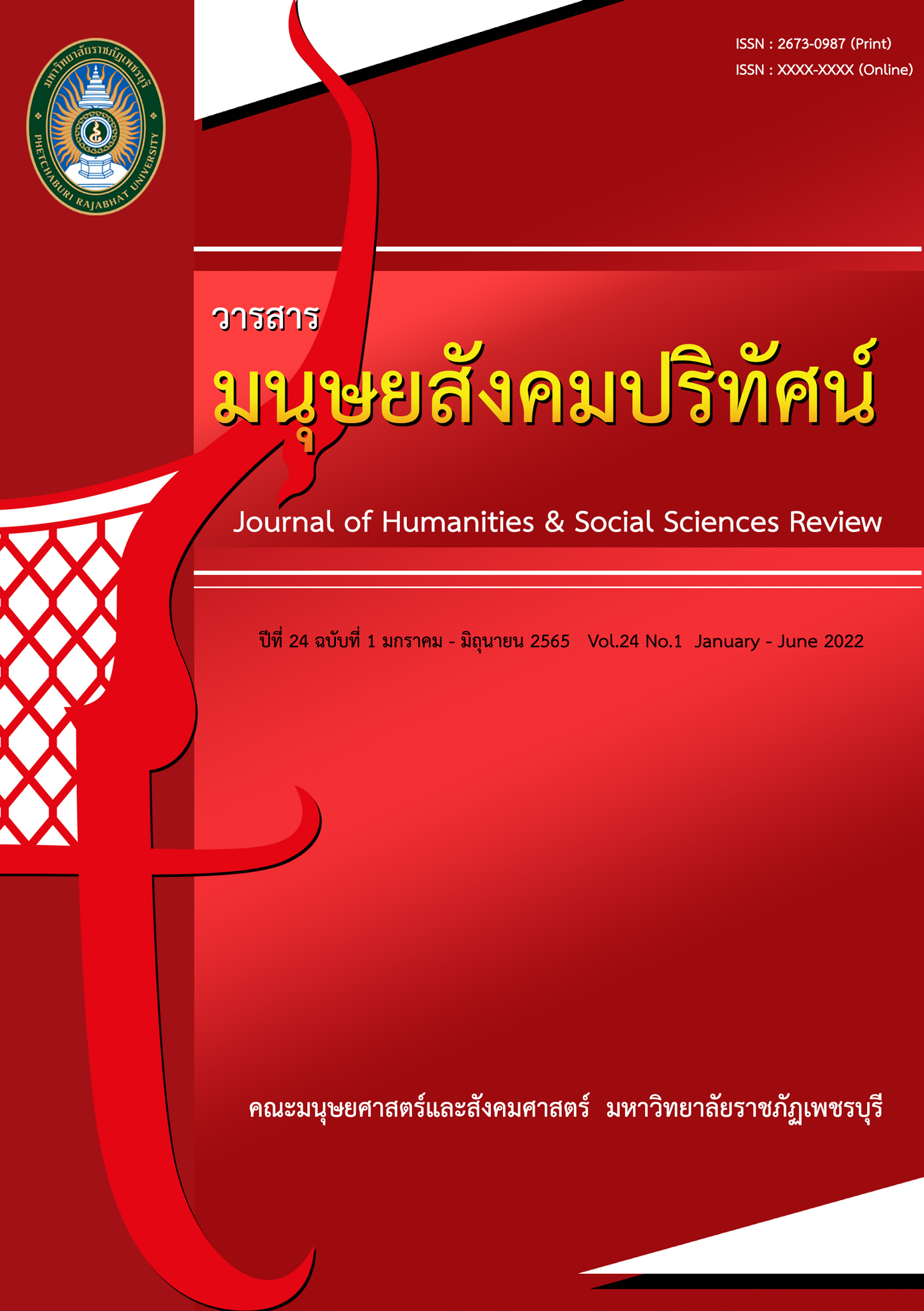The Development of Local History Instructional Model by Using Oral History to Enhance Historical Empathy for Secondary Students
Main Article Content
Abstract
The purposes of this research were to 1) develop the local instructional model by using oral history to enhance historical empathy for secondary students and 2) evaluate the effectiveness of the local instructional model by using oral history to enhance historical empathy for secondary students. The population of this research was the students in the tenth grade of Paknamchumphon Wittaya school during the first semester of the 2021 academic year, who had studied the subject of local history as an additional course in the field of history. This research applied the process of research and development (R&D) and collaboration with the instructional system design (ADDIE model). The instruments of this research included, lesson plans, and achievement test on the subject of local history, an evaluation form of historical empathy for secondary students and student satisfaction questionnaires. The data were analyzed by mean () standard deviation (S.D.) analyzing achievement test after learning with the instruction model was higher than before learning with the instructional model at .05 level and content analysis. The finding of the research revealed as the following: 1) The local instructional model by using oral history to enhance historical empathy for secondary students was named “ECCA Model” and had an index of objective congruence (IOC) between 0.75 – 1.00. It’s consisted of 4 components: principles, objectives, learning process involves 4 steps, namely 1.1) Engage in the local historical empathy (E) 1.2) Construct an image of the local historical empathy (C) 1.3) Construct the local historical understanding (C) 1.4) After learning review the local historical empathy (A)and condition related with instructional model implementation, which was social system, support system, and responsiveness. 2) The study of the effectiveness of the local instructional model by using oral history revealed that 2.1) The student’s achievement test in the subject of local history after learning with the instruction model was higher than before learning with the instructional model at .05 level 2.2) The development of historical empathy for the students was increased respectively 2.3) Student’s satisfaction toward the instructional model was at the highest level.
Article Details
1. Any views and comments in the article are the authors’ views. The editorial board has not to agree with those views and it is not considered as the editorial board’s responsibility. In case, there is any lawsuit about copyright infringement, it is considered as the authors’ sole responsibility.
2. The article copyright belonging to Faculty of Humanities and Social Sciences, Phetchaburi Rajabhat University are copyrighted legally. Republication must be received direct permission from the authors and Phetchaburi Rajabhat University in written form.
References
กระทรวงศึกษาธิการ. (2551). หลักสูตรแกนกลางการศึกษาขั้นพื้นฐาน พุทธศักราช 2551. กรุงเทพฯ: ผู้แต่ง.
ปิยนาถ บุนนาค. (2563). ประวัติศาสตร์จากคำบอกเล่า. สืบค้นเมื่อ 10 ธันวาคม 2563, จาก http://www.bia.or.th/fileupload/1_ทำไมต้องประวัติศาสตร์จากคำบอกเล่า.
พรรณี บัวเล็ก. (2563). ประวัติศาสตร์จากการบอกเล่า. สืบค้นเมื่อ 10 ธันวาคม 2563, จาก https://voicelabour.org/.
_______. (2563). ประวัติศาสตร์จากการบอกเล่า: ทฤษฎี และประสบการณ์. สืบค้นเมื่อ 10 ธันวาคม 2563, จาก https://www.slideshare.net/ssuser27eb42/2-58586004.
ยงยุทธ ชูแว่น. (2562). ครึ่งศตวรรษแห่งการค้นหาและเส้นทางสู่อนาคตประวัติศาสตร์ท้องถิ่นไทย. กรุงเทพฯ: ยิปซี กรุ๊ป.
ระวิวรรณ ภาคพรต และคณะ. (2554). เพื่อนคู่คิด มิตรคู่ครู: แนวทางการจัดกิจกรรมการเรียนรู้ประวัติศาสตร์. กรุงเทพฯ: โรงพิมพ์ชุมนุมสหกรณ์การเกษตรแห่งประเทศไทย.
เลิศชัย ศิริชัย. (2553). ประวัติศาสตร์ท้องถิ่นกับการส่งเสริมกระบวนการศึกษาประวัติศาสตร์ท้องถิ่น ใน การสัมมนาทางวิชาการประวัติศาสตร์สุราษฎร์ธานีในบริบทการเปลี่ยนแปลงสมัยใหม่, วันที่ 17-19 สิงหาคม 2553, ณ ห้องประชุมพุธทาส มหาวิทยาลัยราชภัฏสุราษฎร์ธานี.
วัชรา เล่าเรียนดี. (2556). รูปแบบและกลยุทธ์การจัดการเรียนรู้ เพื่อพัฒนาทักษะการคิด. นครปฐม: โรงพิมพ์มหาวิทยาลัยศิลปากร.
วิชิตวงศ์ ณ ป้อมเพชร. (2563). จิตสำนึกทางประวัติศาสตร์. สืบค้นเมื่อ 10 ธันวาคม 2563, จาก https://www.matichon.co.th/columnists/ news_576372.
วินัย พงศ์ศรีเพียร. (2547). วิธีการตรวจสอบหลักฐาน การค้นคว้าข้อมูลและวิธีการวิเคราะห์ข้อมูลทางประวัติศาสตร์. วารสารวิชาการ, 7(2): 69-81.
สิริวรรณ ศรีพหล. (2553). รายงานการวิจัยเรื่องการพัฒนาชุดฝึกอบรมทางไกลสำหรับครูสังคมศึกษาเรื่อง การจัดการเรียนการสอนวิชาประวัติศาสตร์ในสถานศึกษา. นนทบุรี: สำนักพิมพ์มหาวิทยาลัยสุโขทัยธรรมาธิราช
ศรีศักร วัลลิโภดม และวลัยลักษณ์ ทรงศิริ. (2557). ประวัติศาสตร์บอกเล่าเพื่อเด็กรักษ์ถิ่น. กรุงเทพฯ: มูลนิธิเล็ก-ประไพ วิริยะพันธุ์.
_______. (2557). ปฏิบัติการประวัติศาสตร์ท้องถิ่น. กรุงเทพฯ: มูลนิธิเล็ก-ประไพวิริยะพันธุ์.
ศศิพัชร จำปา. (2558). การพัฒนารูปแบบการจัดการเรียนรู้ประวัติศาสตร์ท้องถิ่นโดยใช้แหล่งเรียนรู้ทางประวัติศาสตร์ เพื่อส่งเสริมกระบวนการคิดทางประวัติศาสตร์. วิทยานิพนธ์ปริญญาดุษฎีบัณฑิต สาขาวิชาหลักสูตรและการสอน มหาวิทยาลัยศิลปากร.
ศุภณัฐ พานา. (2560). การพัฒนารูปแบบการเรียนการสอนประวัติศาสตร์ตามแนวคิดสืบสอบแสวงหาความรู้เป็นกลุ่มร่วมกับแนวคิด Magic if เพื่อส่งเสริมทักษะการคิดทางประวัติศาสตร์และการรับรู้ความรู้สึกทางประวัติศาสตร์สำหรับนักเรียนระดับชั้นมัธยมศึกษาตอนปลาย. วิทยานิพนธ์ปริญญาครุศาสตรดุษฎีบัณฑิต สาขาวิชาหลักสูตรและการสอน จุฬาลงกรณ์มหาวิทยาลัย.
Barton, K., and Levstik, L. (2009). Teaching history for the common good. London: Routledge.
Barton, K., and Levstik, L. (1991). Young children’s thinking in history. Doctoral dissertation, London University Institute of Education.
Davison, M. (2012). It’s is really hard being in their shoes: Developing historical empathy in secondary school students. Doctoral dissertation, University of Auckland.
Joyce B.R., et.al. (2011). Models of teaching. Boston: Pearson.
Keith, C and Linda, L. (2010). Why Don’t More History Teacher Engage Students in Interpretation. Social Studies Today Research and Practice, 22(2): 37.
Marino, M.P. (2012). Urban space as a primary source: Local history and historical thinking in New York City. Social Studies, 3(3): 107-116.
Seixas, P., and Peck, C. (2004). Teaching historical thinking. In Sears, A., & Wright, I. (Eds.). Challenges and prospects for Canadian social studies. (pp. 109-117). Vancouver: Pacific Educational Press.
Yilmaz, K. (2007). Historical empathy and its implications for classroom practices in schools. The History Teacher, 40(3): 331-337.


